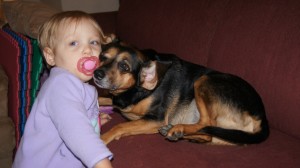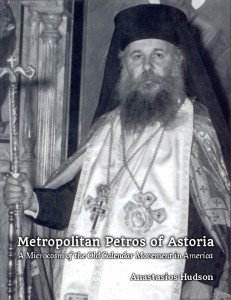Trusting in God
A few days ago, my dog developed an itch and it became apparent that she needed to go to the veterinarian for treatment. It’s a recurring problem, completely minor, which takes less than a minute to alleviate. For my dog, however, it’s a traumatic experience on two counts; the first is that she hates traveling in the car, and the other is that she is afraid every time she goes in to the veterinarian’s office. The car must do something to her balance or her stomach, and she becomes upset, unsure of her footing, not knowing in what direction she is going. The veterinarian’s office represents greater uncertainty; she sees other dogs, some of whom are in pain, hears new sounds, and sees new things. The floor is cold, and there is a sterile smell in the air from the cleaning agents used to wipe down every surface.
She knows the veterinarian’s office by sight, and as soon as we pull in the parking lot, she begins to cower and shake. For any animal lover, it’s a pitiful sight to see one’s beloved pet terrified. I took her in to the office, registered her, and then we waited. As each moment went by, she became more afraid, and the anticipation was fueling it. I held her in my arms (she is a medium sized dog), petting her gently, and whispering comforting words to her. She continued to shake, but she was not squirming as much. Finally, the veterinarian entered, performed the procedure, and we were done. She was relieved of her itch, and she bolted for the door. I rendered payment, and we went to the parking lot; she went directly for our car, which she recognizes, wagging her tail, utterly relieved.
While my dog was shaking in my arms, and I was trying to console her, an obvious analogy came to my mind. It was nothing profound, but I felt it deeply. As I looked in to her eyes, and saw her fear, I felt utter compassion and love for her. She didn’t know what she was experiencing or why, but she trusted me despite her fear. She didn’t try to claw her way out of my arms, but rested there waiting. She trusted that I knew what was best, even though she was not happy. I thought about how on some level, this must be similar to how God sees us in our pitiful state.
God knows what we need, what is best for us, what the medicine is to cure our souls, and He is willing to patiently guide us towards it. We are unable to see the clear end of the path we are on, and are constantly being cast off course by distractions, temptations, and adversaries. Terrible things happen, even to good people, because this world of sin has become corrupted and knocked off balance. Yet we are not alone in this. God looks in our eyes as it were, but even more than this, He peers into the depths of our souls, and He loves us. He is there to hold us, to nurture us, and to guide us. We may not understand the “why” of any given situation, but we know that there is a solution, a purpose, an ultimate end.
Two key differences between a man and a dog, however, are free will and the noetic faculty of the soul of man. Man possess free will to choose good or evil; he has a choice of response that far surpasses the limited, pre-configured responses than an animal has to any given situation. In addition, while both man and animals have souls, only man has a noetic faculty, the highest part of the soul, which allows him to have rational communion with God. An animal cannot think with the same breadth of rationality, nor can it create an abstraction from an abstraction, and thus it cannot have a rational relationship with God, which is a life of prayer. This has two implications.
The first implication is that while my dog responded to my loving attempt to calm her, she did not abstractly consider the implications of either accepting or not accepting my embrace. She was not able to calm herself by reasoning that the situation was not as grave as it seemed. Man, on the other hand, can both choose to reject the consoling love of God, which sometimes is manifested as a chastisement, as when a father scolds his child for running across the street without looking, in order to protect him; and he can attempt to console himself by replacing the love of God with his own devices. We see people “self-medicating” with alcohol, drugs, giving in to carnal pleasures, and gluttony, for instance. An animal cannot participate or choose not to participate on this level.
The second implication is that unlike an animal, by reason of possessing a more developed soul, man can communicate with God. By constantly submitting to the will of God, man can attain union with Him and can become free of the cares of life by placing all his trust in God. Unlike an animal which can only respond to a stimulus, man can anticipate. By being in an ever more proper and close relationship with God, man can learn discernment and can avoid situations that lead to trouble. At a certain point, as his trust in God continues, he becomes so completely one with God that he is not thrown off by the cheap distractions of this world. He knows that the trips to the veterinarian as it were are for his own good, and that his master, the Lord, is guiding him. He in turn feels the same love back towards God that God feels for him, although in a limited capacity owing to man’s limited nature.
While my dog’s response to me was predictable, man’s response to God is unpredictable. Yet God’s actions towards us are always of supreme love, and we have the freedom to accept His loving embrace. The deep affection that a human feels for his pet is nothing compared to the deep love that God has for His creation (after all, God became man in order to suffer death on the Cross!), but let us learn from the analogy what we can and strive to increase our trust in the Lord.



